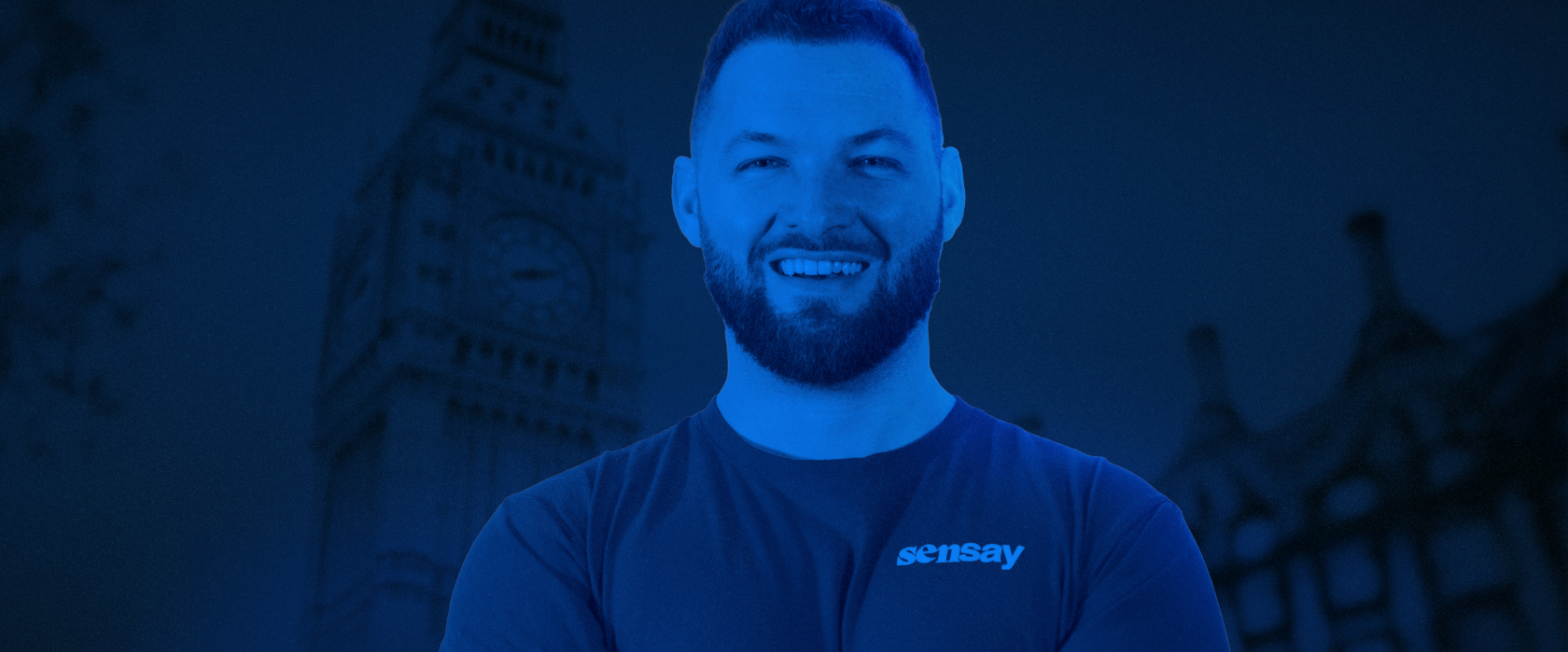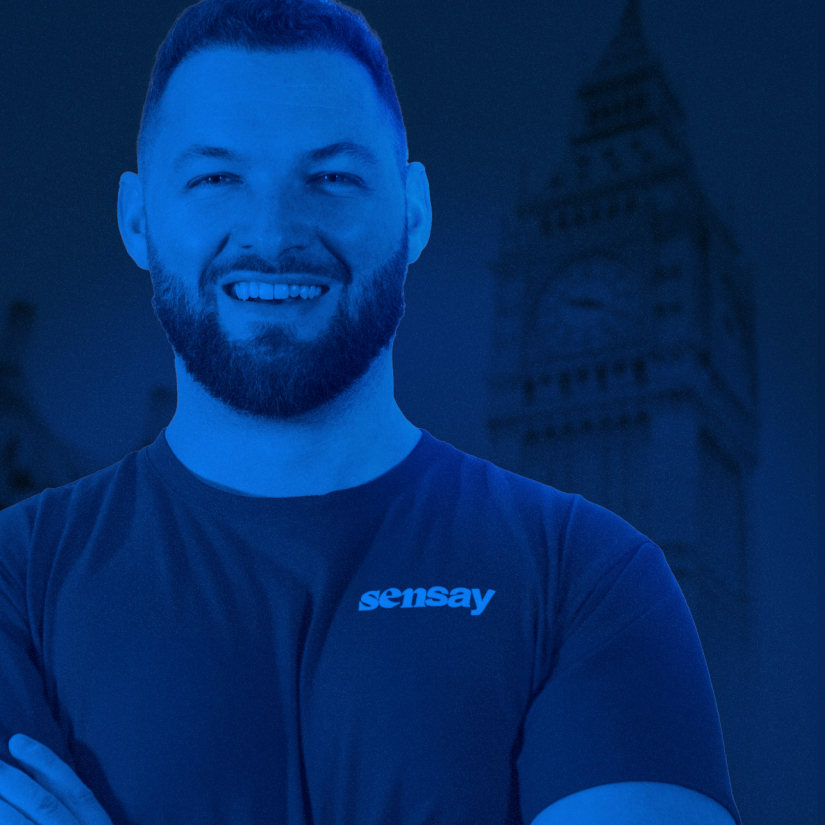August 22, 2025
Sensei CEO Dan Thomson On Digital Identity And Nomadic Leadership
Dan Thomson, CEO of Sensei, shares how AI twins on-chain redefine identity, how crypto powers borderless living, and what 100+ countries taught him about culture, freedom, and resilience.


Interviewer: Dan, thank you for joining us today. Let’s start with a quick introduction for those who might not know you.
Dan Thomson: Thanks for having me! I’m the founder and CEO of Sensei, a platform that enables anyone to create their own personal AI replica on-chain. My background is pretty diverse—I studied philosophy and completed an MBA before diving into hospitality as a restaurateur. Later, I ventured into Web3 and crypto, working as a CMO at an insurance protocol and launching Europe’s first crypto index fund in Gibraltar.
For the past two years, my focus has been on Sensei, a project built to bring the concept of digital immortality closer to reality.
Interviewer: Could you elaborate on Sensei and the vision behind it?
Dan Thompson: Absolutely. Sensei is a personalized AI agent platform designed to create digital replicas of individuals, on-chain, using their data footprint. These replicas serve as extensions of their creators, with applications ranging from personal assistants to education, healthcare, gaming, and even legacy and grief tech. The platform is rooted in my earlier explorations into digital immortality and mind uploading, concepts I wrote about almost eight years ago. By leveraging AI and blockchain technology, Sensei aims to capture not just skills and experiences but the very personality of a user, enabling their digital twin to interact in meaningful ways, authorized and verified by the individual.
Interviewer: That’s fascinating! Let’s pivot to a more personal perspective—what does a typical day in your life look like?
Dan Thomson: Honestly, it’s pretty intense. I’m usually up around 5 to 7 AM, depending on time zones, because I often have calls with Asia and Europe right from the moment I wake up. The first half of my day is packed with calls—five, six hours non-stop. Afternoons are for catching up on tasks, emails, and strategic planning. If I’m lucky, evenings are for exploring wherever I am—trying local food, enjoying the nightlife, or just unwinding with my girlfriend.
Interviewer: That sounds like a demanding but exciting schedule. You’re also quite a traveler, right? How do you manage your routine while being constantly on the move?
Dan Thomson: I’ve been living a nomadic lifestyle for over five years now, hopping between countries every few weeks. I’ve visited over 100 countries, and each place brings its own challenges and charms. I’ve learned to adjust my calendar in advance depending on my destination.
Interviewer: With such a fast-paced life, how do you spend your free time? Are you more of a stay-at-home person, or do you like going out?
Dan Thomson: Traveling forces me to explore new places. If I stayed in one city for too long, I’d probably just spend all day at my computer. But being constantly in new environments pushes me to experience the local culture—whether that’s visiting markets, trying adventure sports, or discovering hidden spots. Of course, food is a huge part of the experience for me.
Interviewer: With over 100 countries visited, what destination has left the most significant impact on you?
Dan Thomson: It’s always the unexpected places that stand out. Everyone talks about Peru or Costa Rica, but for me, Nicaragua and Bolivia offered similar experiences with fewer crowds and more authenticity. But if I had to pick one life-changing destination, it would be Antarctica. It’s like visiting another planet—majestic, untouched, and absolutely surreal.
Interviewer: How did you get to Antarctica?
Dan Thomson: I took a small cruise on a former icebreaker ship during the pandemic. It was a two-day sail across the Drake Passage, which is famous for its hurricane-like winds and massive waves. Once there, we spent about a week exploring—kayaking, ice climbing, and observing whales and penguins. It’s an experience I’ll never forget.
Interviewer: That sounds incredible, but obviously getting to Antarctica isn't that easy . Among the more accessible locations, is there a place you’d recommend everyone to visit?
Dan Thomson: Brazil is a must-visit. The energy, music, and people make it an unforgettable experience. Then there’s Sri Lanka, which I’d call the perfect holiday destination. It’s affordable, culturally rich, has stunning beaches, and offers everything from temples to mountain treks. And for food lovers, Vietnam is paradise.
Interviewer: What about your home city, London. Is it a must-visit city? What are your personal recommendations for someone visiting?
Dan Thomson: London is, in my opinion, the greatest city in the world. It’s a melting pot of cultures, history, food, and endless opportunities. If you’re visiting, here are my top recommendations:
Cocktail Bars: London boasts some of the best cocktail bars in the world, particularly in Soho and Shoreditch. These areas are home to top-tier mixologists crafting innovative drinks that elevate the entire experience. Soho offers a cozy, buzzing vibe, while Shoreditch has a more eclectic, edgy atmosphere. Both are must-visits if you’re into world-class cocktails.
Walking Tours: For a more immersive feel of London, I’d suggest a walking tour that takes you from Soho to Westminster. Start in the vibrant streets of Soho, head past iconic landmarks, and end at the serene views from Waterloo Bridge. The bridge, in particular, offers breathtaking views of the city—day or night—and truly captures London’s heart and soul.
London Bus Tour: If walking isn’t your thing, the traditional London bus tours are a fantastic way to soak in the city’s history and landmarks in a short amount of time.
Interviewer: To sum up your traveling experience - as a crypto advocate, how has blockchain technology influenced your travels?
Dan Thomson: It’s been transformative. For instance, in Venezuela, my traditional banking methods don’t work due to international sanctions. Crypto steps in as a lifeline—it allows me to pay for essentials, order services, and even convert crypto to cash. It truly embodies the idea of “banking the unbanked” and offers a layer of freedom from centralized systems. This autonomy is crucial not just for travelers but also for communities restricted by geopolitical or financial barriers.
Interviewer: Let’s talk about food. Do you have a favorite cuisine or dining experience that stands out?
Dan Thomson: Oh, I’m a huge fan of Peruvian, Vietnamese, Spanish, and Indian cuisine. Each offers something unique—whether it’s the bold flavors of Peruvian dishes or the subtle balance in Vietnamese cooking. I’ve also had some incredible experiences with street food in Mexico, despite knowing it might “hurt” later!
Interviewer: That’s very relatable! What about fine dining versus street food? Do you have a preference?
Dan Thomson: Both have their charm. Fine dining is about the experience, creativity, and presentation, while street food is often about raw flavor and authenticity. Some of my most memorable meals have been at small, local restaurants rather than Michelin-starred spots. For example, I found an incredible French restaurant in Córdoba, Argentina, where the food was outstanding and the price ridiculously low. I went back every single day while I was there.
Interviewer: How do you usually discover these hidden gems? Do you rely on reviews, recommendations, or just instinct?
Dan Thomson: It’s a mix. Sometimes I rely on recommendations from locals, sometimes it’s luck. I wish there was a Michelin guide for affordable, authentic gems—a list that highlights places with incredible quality and value. But often, these spots are hard to find because they’re not hyped online.
Interviewer: Could you share some of your favorite restaurants from around the world?
Dan Thomson: Absolutely! Some of my all-time favorites include Coya London, a Peruvian spot that never disappoints, and Central in Lima, which is simply world-class. In São Paulo, Casa do Porco is a must-visit—it’s an incredible experience from start to finish. I also have a soft spot for Cuchara de San Telmo in San Sebastián, where you can find some of the best tapas in the world. For something a bit unexpected, there’s a little place called La Casa del Francés in Córdoba, Argentina. It’s a small French restaurant that consistently serves the freshest, most delicious meals, and it’s incredibly affordable.
Interviewer: Let's talk about crypto events. You’ve attended your fair share of meet-ups and conferences. Which ones do you consider must-attend, and do you have any tips for newcomers?
Dan Thomson: The big ones are:
- ETH Denver
- Token 2049 (in Singapore and Dubai)
- Consensus
- Paris Blockchain Week
- Devcon and Devconnect
But here’s the thing—tickets for these events can be incredibly expensive. For anyone on a budget, I’d say focus on the side events. These often have free entry and are where the real networking happens. Sometimes, just sitting in a café near the main venue can lead to meaningful conversations and connections.
For a more relaxed vibe, smaller community-driven festivals like Crypto Fest in Bali or the Crypto Festival in Tulum are worth checking out.
Interviewer: Finally, Dan, any advice for those looking to start their journey in the crypto space?
Dan Thomson: Stay curious, adaptable, and connected. The crypto industry moves fast, and the only way to keep up is by staying informed and building relationships with people in the space. Don’t be afraid to ask questions, join online communities, and attend local events. And most importantly, focus on long-term value creation, not just short-term gains.
Interviewer: Dan, this has been an incredibly insightful conversation. Thank you for sharing your journey, your wisdom, and your perspective on the future of crypto and AI.
Dan Thomson: Thank you—it’s been a pleasure!








